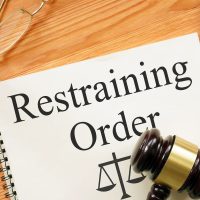Domestic Violence and Restraining Orders in New Jersey

Domestic violence is a critical issue that affects many individuals and families in New Jersey. It encompasses a range of behaviors, including physical harm, emotional abuse, and other forms of control and intimidation between family members or intimate partners. The Law Offices of John B. D’Alessandro recognizes the complexities surrounding domestic violence cases and is dedicated to guiding clients through the legal avenues available for protection and justice. Read on for an overview of family court procedures and New Jersey domestic violence laws. For help with a domestic violence matter in Union, Middlesex, or Essex County, contact the Law Offices of John B. D’Alessandro to speak with an experienced and dedicated Union family law attorney.
The Role of Family Courts in Domestic Violence Cases
In New Jersey, the Family Practice Division is central to addressing cases of domestic violence. These courts not only hear divorce and child custody cases but also play a crucial role in providing legal remedies to victims of domestic violence. The primary focus of family courts in such cases is to ensure the safety and well-being of victims and, if involved, their children.
Obtaining a Restraining Order: A Key Protection Measure
One of the significant legal tools available to victims of domestic violence in New Jersey is obtaining a restraining order. A restraining order is a court order that protects a person from further harm by legally restricting the abuser’s actions and behaviors.
Step 1: Filing a Complaint. The process begins with the victim filing a complaint in the family division of the Superior Court in their county. In urgent situations, a local police department can assist in filing a complaint and obtaining a temporary restraining order (TRO) at any time, day or night.
Step 2: Temporary Restraining Order (TRO). Once a complaint is filed, the judge may issue a TRO, which provides immediate, short-term protection. This order can include provisions like barring the abuser from entering the victim’s home or place of work, and deciding temporary custody of children.
Step 3: Final Restraining Order (FRO) Hearing. A final hearing is typically scheduled within ten days of the TRO. During this hearing, both parties have the opportunity to present evidence and testimony. The judge will then decide whether to issue a Final Restraining Order (FRO), which offers long-term protection.
Legal Representation: Navigating the Complexity of Domestic Violence Law
While it is possible to seek a restraining order without an attorney, having legal representation can significantly impact the process’s outcome. An experienced family law attorney can help in several ways:
-
Preparing for the Hearing: An attorney can help gather and organize evidence, prepare testimony, and offer guidance on court procedures.
-
Advocacy in Court: Legal representation ensures that the victim’s voice is heard and their rights are protected during the hearing.
-
Guidance on Related Matters: Issues like child custody, support, and property division often intersect with domestic violence cases. An attorney can provide comprehensive assistance on these related matters.
The Commitment of Law Offices of John B. D’Alessandro
At the Law Offices of John B. D’Alessandro, we understand the emotional and legal complexities involved in domestic violence cases. Our firm is committed to providing compassionate, knowledgeable legal support to individuals in Union, Middlesex, and Essex counties. We strive to empower our clients, helping them navigate the family court system effectively and ensuring their rights and safety are prioritized.
For professional legal assistance with domestic violence and restraining order cases in New Jersey, contact the Law Offices of John B. D’Alessandro in Union by calling 908-964-0102. Our expertise in family law, combined with our commitment to our clients’ safety and rights, makes us a trusted ally in these sensitive matters.

